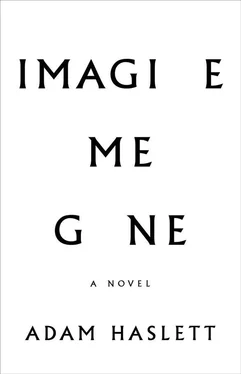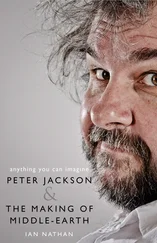They’ve chosen the new restaurant down from the inn, and of course it’s far too expensive. Eight dollars for a salad. Sixteen for pasta. I could have made a perfectly good meal at home. There was no need to be lavish. Michael has no money for this kind of thing, which means it will be all the other two, and I can’t let them do that. A New Traditional Grill, it calls itself, oak banquettes gleaming under brass lights, the kitchen on display behind a glass barrier, not a stitch of fabric to absorb the diners’ voices rising over the music and clatter of pans.
Trying to be heard over the din, I tell the waitress I’ll have the soup, which produces a chorus of sighs.
“It’s your birthday!” Alec practically shouts.
“I had a big lunch. I’ll just have a bite of yours.”
The waitress and I exchange a smile. She seems like a friendly young woman.
“Order an entrée,” Alec instructs, “and we’ll get a bottle of wine. What kind of wine do you want?”
“A bottle?” I ask.
Michael rolls his head back on his shoulders, as if praying to the heavens, which he certainly isn’t.
“We’ll need another minute,” Celia says.
It’s so good to have them all here, and I don’t want to argue, but it makes no sense to order food I don’t want.
“You like fish,” Alec says. “Get the grouper.”
Eighteen dollars. He’s like his father: spending as if he has the natural right to live now as he plans to later.
“I’m fine. Maybe I’ll get a dessert.”
“You can’t make her eat,” Celia says with cool fixity.
“It’s dietary martyrdom,” Michael says. “It has a long pedigree.”
“Don’t be ridiculous. I’m just not that hungry. Let’s not spoil it, let’s just have our meal, can’t we?”
We reapply ourselves to the menus, the moment passes, and Michael asks Alec if he thinks he’s becoming identified with the white-male power structure now that he works for a national news magazine. “Purely at the level of the psychic,” Michael says, as if clarifying. “I’m not saying you’re a reactionary. As such.”
“I’m a researcher and I edit news summaries,” Alec says. “And my boss is a woman.”
“Right,” Michael says. “But is she a radical feminist?”
“She’s a features editor. She’s not radical about anything.”
When the waitress circles back to us, I’m allowed my soup.
“But would you say — again, at the level of the psychic — that the life-worlds of the people you work with are constituted at least in part through an identification with the structures of wealth and power they report on?”
“I’d say they’re underpaid and distracted, and most of them are political junkies.”
“I’m not talking about electoral politics.”
“Why? Because you think they’re irrelevant?”
“I wouldn’t say irrelevant . They’re obviously central to the fantasy of nationalism—”
“I’ll have the stuffed chicken,” Alec says.
“I told you Alice Jolly went to Vassar with your godmother, didn’t I?” I ask Alec, not certain if I remembered to or not. The three of them glance at me dumbfounded, as if braced for the outburst of some insane relative at Thanksgiving. “Alice Jolly, she’s married to Arthur Jolly, the man who edits your magazine. She went to Vassar with Ursula. Didn’t I tell you that?”
“What does that have to do with anything? ” Michael says.
“I just thought it was quite a coincidence.”
“That’s precisely what it isn’t, ” he says, at which point I give up.
As usual in such places, the portions are obscene. Michael’s pork chop could feed a village. My soup comes in a bowl a foot wide with an extra basket of bread I neither want nor need.
Alec consumes his food with something akin to lust, devouring it in minutes. His creaturely habits haven’t changed since he was a boy, though they are strained now through his more elaborate persona, which makes for a certain tension. It’s as though the fever of his adolescence never burned off, but he’s desperate not to show it. He wishes he were smoother, and tries hard to be. Which can make him brittle. Difficult not to think that it has something to do with his being gay. The effort to control people’s impressions of him.
He was only seventeen, still a boy, when he announced it to me, and yet he did it with such seriousness and finality. When I suggested he might want to keep an open mind, that people often go through phases, he asked if I’d said the same to Michael and Celia when it became obvious they were heterosexual. Which I obviously couldn’t say that I had. He seemed greatly satisfied by his rhetorical victory. I know better now than to tell him I worry about AIDS.
“So,” Celia says, “just so everyone’s been informed, we’ve got our appointment on Tuesday.”
“Is it with a Lacanian?” Michael asks.
“He does family therapy,” Celia says. “We’re not lying on couches and being told to leave after five minutes. We’re not doing theory.”
“Isn’t that what you studied?” I ask Celia.
“Mom, I have a degree in social work. Michael’s talking about literary criticism.”
“Not literary,” he says. “In fact, I think we need to move away from the text, into the realm of pure affect.”
“He’s a psychotherapist, okay? He’s going to talk to us about the dynamics that have built up over the years.”
“The dynamics,” I say.
“Patterns,” Celia says.
“Which are a bad thing?”
“If you don’t want to go,” she says to me, “you don’t have to.”
“No, no,” I say, not wanting to upset her. “I’m sure there are patterns. And no doubt they’re my fault.”
“Case in point,” Alec says.
“What’s that supposed to mean?” I ask, eliciting another roll of the eyes, as if it’s too obvious to explain.
“No doubt I was a wretched parent,” I say. “And burdened you all with all sorts of things I shouldn’t have.”
“Oh, Mom, come on, ” Michael says, “ please .”
“What?” I say. “That’s what you think, isn’t it?”
Their expressions go blank with patience.
“I should have sold the house and moved us somewhere that doesn’t remind you all of the past. Somewhere you wanted to come back to more than twice a year.”
“No, you shouldn’t have,” Alec says. “You like the house.”
He has always been the most protective of me, in his way. It’s been true since he was young. I remember walking with him when he was only five or six, holding his hand, and his looking up at me and saying very earnestly, “I would die so that you could live.” It was one of those preternatural utterances children sometimes make when they first glimpse that things don’t last forever. It has always stuck with me, though. He may have been a hyperactive child, and may still be stubborn and overexcitable, but his love is the simplest.
About the house, he’s right. It took time, but I am comfortable there now. My first instinct was to leave. The alarm would startle me awake in our bed each morning, and I’d think: He’s going to be late for work, you have to get him up. And then I’d see the unruffled covers beside me, and I would feel ill once more, as in that first moment— John. Never again . But you can’t sustain that sort of thing. It wears you out. Celia and Alec had high school to finish. Michael needed a place to come home to. When Alec left for college — Celia had instructed him to follow her example and apply only to institutions with need-blind admissions — and before Michael dropped out, I thought again about moving, wondering if being there on my own would be too much. But there were the things I liked. The quiet street, with no house opposite, just grass and trees running down to the path along the brook, and the fireplace, which I use most evenings in fall and winter, and the old sash windows like the ones I grew up with, and two healthy pear trees in the front yard.
Читать дальше












